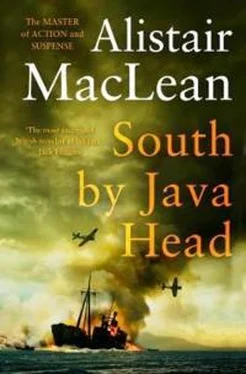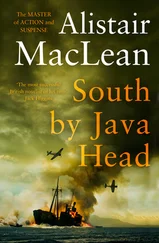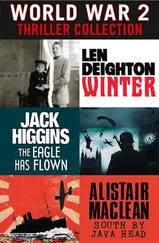“Almost due south of us now, sir. About two hundred yards offshore.”
He suddenly dropped the binoculars and pushed himself back down into the hollow. A searchlight had just been switched on in the conning-tower of the submarine, its dazzling white beam swinging rapidly along the rocky shore of the island. Almost at once it found the little notch in the shoreline where the lifeboats lay, steadied there for a couple of seconds, then started moving slowly up the hill, almost in a line with the hollow where they lay hidden.
“Brigadier!” Nicolson’s voice was sharp, urgent.
“It’ll be a pleasure,” Farnholme grunted. He slid the carbine forward along the ground, cradled it to his shoulder, sighted and fired, all in one swift movement. It was set for single shot firing, but the single shot was enough: through the fading echoes of the crash of the carbine they caught the distant tinkle of glass, and the white glare of the light faded quickly to a dull red glow, then died away altogether.
“Stay with us a few more days, will you, Brigadier?” Findhorn said dryly. “I can see that we’re going to need you around… Hardly a very bright move on their part, was it, Mr. Nicolson? I mean, they’ve already had a sample from the Brigadier here.”
“Bright enough,” Nicolson differed. “A calculated risk, and it paid off. They’ve found out where the boats are and they know now, from the flash of the brigadier’s rifle, where we are, two facts it might have cost a landing party a long time and a good few lives to find out. But it was really the boats they were worried about, not us. If they can stop us from leaving the island, they can get us at their leisure, preferably in daylight.”
“I’m afraid I agree with you,” Findhorn said slowly. “The boats come next. Sink them from the sub, you reckon? We can’t stop them if they do.”
“Not from the sub.” Nicolson shook his head. “They can’t see the boats and it would take them all night to sink them with random fire: a hundred lucky shots at least. A landing party to knock the bottom out of the boats and spike the air tanks is more likely – or tow them or row them out to sea.”
“But – but how do they get ashore?” Vannier asked.
“Swim if they have to, but they don’t have to. Most subs carry collapsible or inflatable dinghies of some kind. For a sub operating in close waters, almost certainly in contact with their own troops on a score of different islands, it would be essential.”
No one spoke for several minutes. The little boy was muttering to himself in his sleep, and Siran and his men were whispering in the far corner of the hollow, their words indistinguishable. Then Willoughby coughed to catch their attention.
“ ‘The flood of time is rolling on, etc., etc.,’ ” he quoted. “I have an idea.”
Nicolson smiled in the darkness. “Careful, Willy.”
“ ‘Base envy hates that excellence it cannot reach,’ ” Willoughby said loftily. “My plan has the simplicity of true genius. Let us sail away.”
“Brilliant.” Nicolson was heavily sarcastic. “Muffled oars in the moonlight. How far do you reckon we get?”
“Tush! You underrate me. Willoughby soaring in the realms of pure thought and our worthy chief officer still trudging in the mire. We use the engine, of course!”
“Oh, of course! And how do you propose to persuade our pals out there to wear ear-plugs?”
“I don’t. Give me an hour on that exhaust-pipe and baffle plates and I guarantee you won’t hear that engine a hundred yards away. Lose some speed of course, but not much. And even if they do hear it, you know yourself how difficult it is to get a bearing on a faint sound over the sea at night. Freedom beckons, gentlemen. Let us no longer delay.”
“Willy,” Nicolson said gently, “I have news for you. The human ear is not to be depended on for finding bearings at night, but then the Japs don’t have to depend on it. They use hydrophones, which are very accurate indeed – and which couldn’t care less whether you muffle the exhaust or not as the propeller thrash in the water will serve them excellently.”
“Damn them,” Willoughby said with feeling. He lapsed into silence, then spoke again. “Let no one despair. Willoughby shall think of something else.”
“I’ve no doubt you will,” Nicolson said kindly. “Don’t forget that the north-west monsoon only lasts for another couple of months or so and it would be handy if– down, everybody, down!”
The first bullets were thudding soggily into the earth around them, ricocheting with a vicious whine off the rocks and whistling evilly overhead as they heard the barrage opening up from the deck of the submarine. It had moved a good deal closer inshore and it sounded as if at least a dozen different guns, machine-guns, two at least, included, were all firing at once. And someone aboard the ship had been fast enough to take a bearing on the flash of Farnholme’s carbine: the fire was as accurate as it was heavy.
“Anybody hurt? Anybody hurt at all?” It was difficult to hear the captain’s low, hoarse voice above the crackle of gunfire.
There was no immediate reply, and Nicolson answered for the others. “I don’t think so, sir. I was the only one exposed at the time.”
“Good enough – and no retaliation just now,” Findhorn warned. “No reason for anybody to get his head blown off.” He lowered his voice with evident relief. “Mr. Nicolson, this baffles me completely. The Zeros didn’t touch us when we left the Viroma : the sub didn’t try to sink us: and the seaplane left us alone even after we’d thumped their pals. And now they’re trying their best to massacre us. It doesn’t make any kind of sense at all to me.”
“Still less to me,” Nicolson admitted. He winced involuntarily as a bullet thudded into the earth a couple of feet above his head. “And we can’t stay here and do an ostrich act, sir. This is a cover for an attack on the boats. Pointless otherwise.”
Findhorn nodded heavily in the darkness. “What do you want to do? I’m afraid I’m a dead loss, Johnny.”
“As long as you’re not just dead,” Nicolson said grimly. “Permission to take some men down to the shore, sir. We must stop them.”
“I know, I know… Good luck, boy.”
Seconds later, in a brief lull in the firing, Nicolson and six men slithered over the edge of the bank and started downhill. They hadn’t gone five paces when Nicolson whispered in Vannier’s ear, caught the Brigadier by the arm and retraced his steps with him to the eastern edge of the hollow. They lay down on the edge, peering into the darkness. Nicolson put his mouth to the Brigadier’s ear.
“Remember, we play for keeps.”
He could just sense Farnholme nodding in the darkness.
They didn’t have to wait long. Within fifteen seconds they heard the first faint, cautious slither, followed at once by Findhorn’s voice, sharp and hoarse, jerking out a question. There was no reply, just another ominous movement, a swift rush of feet, the sudden click as Nicolson’s torch switched on, the brief glimpse of three running stooping figures with upraised arms, the stuttering crash of Farnholme’s automatic carbine, the heavy thud of falling bodies and then the silence and the darkness together.
“Bloody fool that I am! I’d forgotten all about these.” Nicolson was crawling about the hollow, torch hooded in his hand, tearing away weapons still clenched in dead hands. He let the light play on them for a moment. “The two hatchets from number two lifeboat, sir. They’d have made a pretty mess at close quarters.”
He shone his torch at the other end of the hollow. Siran was still sitting there, his face smooth and expressionless. Nicolson knew that he was guilty, guilty as hell, that he had sent his three men to do the hatchet-work – literally – while he remained safely behind. He also knew that the bland, inscrutable face would remain that way as Siran denied all knowledge of the attack: dead men couldn’t talk, and the three men were quite dead. There was no time to waste.
Читать дальше
Конец ознакомительного отрывка
Купить книгу










